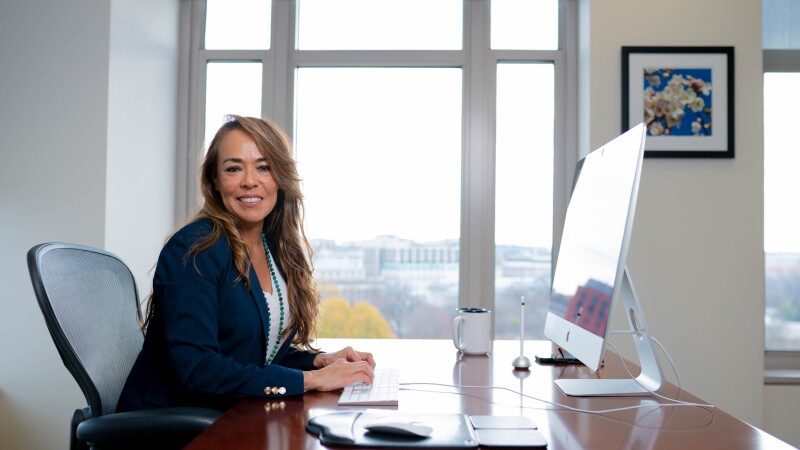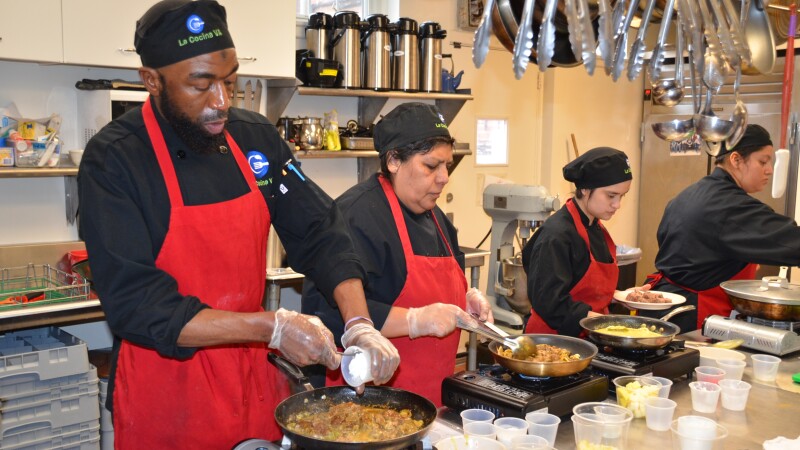AARP Hearing Center
Karina had been an accountant in Mexico before moving to Northern Virginia, where she raised three children while trapped in an abusive marriage.
A social worker referred her to La Cocina VA, a non-profit job training and placement program based in Arlington. Soon, Karina was learning the culinary skills and vocational English needed to work in the food service and hospitality industry. She landed a job as a cook in a Capitol Hill hotel that offered to cover the costs of furthering her English education and train her to be a chef. She was able to leave her marriage, rent a home and afford childcare.
Another woman in an abusive marriage had to study by flashlight in the bathroom because her husband objected to her participating in the program. But when she walked across the graduation stage and received her white chef coat with her name inscribed from La Cocina VA, her husband—for the first time—said he was proud of her and her children presented her with flowers.
These are just a couple of the many success stories that Paty Funegra, CEO and founder of La Cocina VA (pronounced la co-SEE-na), points to with pride. Funegra is one of the 10 AARP Purpose Prize Fellows for 2021 that each was awarded $5,000 for their activities. Five AARP Purpose Prize Winners each received $50,000.
A native of Peru, Funegra lived there and in Argentina before moving to the United States in 2007 to work for the Inter-American Development Bank in Washington. She became a U.S. citizen five years ago.
Although her work had involved assisting developing nations, primarily in Latin America and the Caribbean, Funegra said she missed seeing how her efforts affected the lives of individuals.
She had been doing volunteer work and was struck by the large number of Hispanic immigrants in the food service industry who were trapped in low-level jobs with little or no opportunity for advancement. Holding them back, she learned, were the twin problems of a lack of the culinary skills and the vocational English necessary to advance in a commercial kitchen setting.
Funegra decided to use her expertise, skills and passion to help them find a pathway to better employment opportunities.
Ignoring the warnings of friends and family that she wasn’t ready for the challenge, Funegra quit her job and used her own money to launch La Cocina VA. She researched non-profits to learn what worked and what didn’t. She approached local churches of almost every denomination in Northern Virginia seeking a place to launch her venture.
In 2014, La Cocina VA began operations in the basement kitchen of the Mount Olivet United Methodist Church in Arlington. Six students from four different Central and South American countries‑-ranging in age from 18 to 50-plus‑-took bilingual classes in cooking and learning the technical language of food preparation. Paid instructors taught from 9 a.m. to 5 p.m., Monday through Friday for 12 weeks. Later, classes expanded to 11 students, a limit imposed by the church’s small kitchen facility.
“Our program teaches students the basics of commercial cooking and technical English, certifies them through a local community college, and places them in jobs in hotels and restaurants,” Funegra said. “In addition, our students prepare healthy meals from food that is donated to our kitchen services, then distribute them to low-income families and homeless individuals.”
To launch the program, Funegra used her own savings and sought support from donors including grocery chains, foundations and wealthy individuals. The funds helped pay for the instructors, transportation stipends and certifications from Northern Virginia Community College. Drawing on her years of working in the international development banking industry, Funegra collected data to show potential contributors how the program was making a positive impact on students’ lives.
Since La Cocina opened, about 160 students have graduated from the program, and roughly 85 percent were hired for jobs in the food industry. One of the strongest supporters of La Cocina VA was the Whole Foods grocery chain, which sent representatives from all of its Northern Virginia stores to interview a full class of graduates.
Upon graduation, students receive a white chef coat with their name on it, and certificates from La Cocina VA, the National Restaurant Association and the Workforce Development Department at Northern Virginia Community College, which monitors the curriculum and testing.
While receiving hands-on training in food preparation—using supplies from local food banks‑‑the students produced healthy meals, which were individually boxed each day and distributed to affordable housing complexes and homeless shelters. Since its inception, La Cocina VA has served more than 25,000 meals to low-income families in need.
In 2018, La Cocina VA launched a $3 million fundraising campaign to build its new facility. Last year, La Cocina VA moved into a 5,000 square-foot facility with a state-of the art kitchen on the first floor the seven-story Arlington Partnership for Affordable Housing subsidized housing building in Arlington.
Funegra said the Zero Barriers Training and Entrepreneurship Center (TEC) there allowed La Cocina VA to nearly triple the number of students who can be trained at one time. And it allowed it to expand its mission beyond the Latino community to English-speaking immigrants from other countries as well as African Americans. It also allowed La Cocina VA to operate evenings and weekends and provided space for a café where students are able to sell their products.
The coronavirus pandemic resulted in the suspension of La Cocina VA’s kitchen activities, but coincided with the launching of its Culinary Small Business Incubator program at the center. The nine-week bilingual training involves a small group of students who are paired with mentors to learn business methods and strategies, such as how to prepare a business plan, create a budget, and navigate the maze of government regulations.
Phase one of the incubator—the mentoring program—will end in February. Then the program will help the students obtain micro-loans, generally ranging from $1,000 to $10,000 from community development financial institutions, which have easier lending rules than major banks. The third phase will allow graduates to rent La Cocina VA’s kitchen facilities, at subsidized rates, to produce food items for sale to local grocery stores, restaurants and farmers markets.
In the future, La Cocina VA may also rent a portion of its kitchen facility to chefs whose small restaurants have closed over the past year because of the pandemic to give them a means to continue producing food products that can be marketed. La Cocina VA may also provide catering services to schools and community facilities in the future after the pandemic passes.
In 2017, Funegra was appointed by Gov. Terry McAuliffe to the Virginia Board of Workforce Development, the first Latina and the first member of the non-profit sector to join the advisory body. Still a member, she has tried to be a voice for people who need assistance in becoming part of the workforce, particularly immigrant women.
“I believe my voice and my contribution to that board opened the eyes and the ears of the members, and also to the governor’s office, on the additional things that could be done to serve these populations,” Funegra said.
For example, while most of the state’s workforce development funds are allocated to training, Funegra said only a small fraction is earmarked for social services necessary to allow low-income workers—particularly immigrant women—to join the workforce.
“If they don’t have a way to cover child care, they cannot attend training and cannot find a job,” Funegra said. “If they have domestic abuse issues—which happens a lot within our community—if they don’t have a way to overcome those situations, they are not in the right mindset…for training to get a job.”
Without safety net services including transportation and affordable housing, low-income immigrant women are trapped “in a vicious circle that never ends because they can never leave their current situation and access the resources to support them‑-so they stay where they are,” she said.
Working with immigrants has reinforced Funegra’s belief that “immigrants can succeed in the United States, especially women. The language barriers can be overcome, bad experiences with domestic abuse can be overcome.
“La Cocina VA provides great content and interesting programs,” Funegra said, “but our main job is to collectively and positively intervene in the lives of these individuals.”
People 50+ who are using their life experience to make a difference are encouraged to apply for this year’s AARP® Purpose Prize® award. Learn more and apply here.


































































